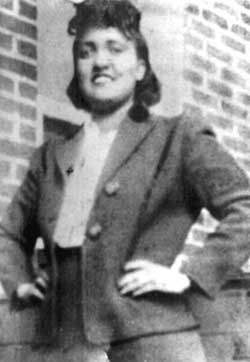The Legacy of Henrietta Lacks

In a special article for Black History Month, IBMS Equity, Diversity, and Inclusion group member Simone Girdham and the IBMS team take a look at the life and impact of Henrietta Lacks, whose tissue samples, which have had an incalculably large impact on the field of biomedical science, were taken without her consent.
Henrietta Lacks was an African-American woman whose cancer cells are the source of the HeLa cell line, the first immortalised human cell line and one of the most important cell lines in medical research. She was born in 1920 and died in 1951 due to cervical cancer. She left a husband and five children behind.
At the time, treatment for cervical cancer was the insertion of radium in and around the cervix. During her treatments at Johns Hopkins Hospital, the only hospital in the area that treated black patients, two pieces of tissue were removed without her permission or knowledge – one from cancerous and one from healthy tissue. Her harvested cells were then given to a local research team who were cultivating cancerous cells.
At university we used HeLa cells. I assumed that there was informed consent. I thought that they had been donated. The university briefly told us about the cells, but missed out the little details, like the history of the cells.
The cells, according to protocol, were designated HeLa (the first two letters of forename and surname). As expected, the healthy HeLa cells died after a few days. However, quite unexpectedly, the cancerous HeLa cells survived and replicated twenty times faster than normal cells.
It was unethical what happened and then how it was handled. There are still issues today for black people.
The immortal HeLa cell line has enabled major medical breakthroughs - most significantly, the Polio Vaccine. In 1955, HeLa cells were the first human cells to be cloned. Her cells continue to be used to this day and were even used to study COVID-19. An estimated 60,000 biomedical science research studies have utilised HeLa cells and there are almost 11,000 patents involving HeLa cells.
While her cells have contributed enormously to the advancement of healthcare, her consent for research was not given. For many years, the name behind the cells was wrongly given as Helen Lane or Helen Larson.
People need to stop saying her cells were used for good reasons; that she helped many people. They stole her cells and changed her name.
Despite the profound impact her cells have had, they were taken, used and put into mass production without her consent. This is particularly noteworthy as Henrietta Lacks was a poor black woman who lived in a time of racial segregation.
Rebecca Skloot documented extensive histories of both the HeLa cell line and the Lacks family in two articles published in 2000 and 2001 and in her 2010 book The Immortal Life of Henrietta Lacks. Skloot worked with Deborah Lacks (Henrietta’s daughter) on the book and used her first royalty check to start the Henrietta Lacks Foundation, which has provided funds for college tuition and medical procedures for Henrietta's family.
In March 2013, researchers published the DNA sequence of the genome of a strain of HeLa cells. The Lacks family discovered this when the author Rebecca Skloot informed them. There were objections from the Lacks family about the genetic information that was available for public access.
In October 2021, Lacks' estate filed a lawsuit against Thermo Fisher Scientific for profiting from the HeLa cell line without Lacks' consent and settled on undisclosed terms.
I am ashamed of our collective past actions which have impacted poorly on marginalised people such as Mrs. Lacks and her family.

What can we learn from Henrietta’s story?
Firstly, it is important to recognise the global impact of her contribution to science, and also the underlying ethics that must stabilise its pursuit going forward. Those using HeLa cells should reflect on their origin and the vital importance of informed consent. As we continue to learn from Mrs. Lacks, we must try to honour her enduring legacy.
This year’s Black History Month is focused on “Saluting Our Sisters” so the IBMS is aiming to recognise the contributions of black female biomedical scientists, and those like Henrietta Lacks, who have contributed to biomedical science but have often been overlooked.
Note: Quotes were anonymised upon request.
